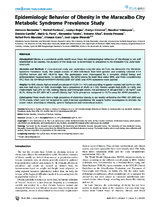Mostrar el registro sencillo del ítem
Epidemiologic Behavior of Obesity in the Maracaibo City Metabolic Syndrome Prevalence Study
| dc.contributor.author | López-Miranda, José | |
| dc.contributor.author | Bermúdez Pirela, Valmore José | |
| dc.contributor.author | Pacheco, Maikol | |
| dc.contributor.author | Rojas, Joselyn | |
| dc.contributor.author | Córdova, Evelyn | |
| dc.contributor.author | Velázquez, Rossibel | |
| dc.contributor.author | Carrillo, Daniela | |
| dc.contributor.author | Parra, María G. | |
| dc.contributor.author | Toledo, Alexandra | |
| dc.contributor.author | Añez, Roberto | |
| dc.contributor.author | Fonseca, Eneida | |
| dc.contributor.author | París Marcano, Rafael | |
| dc.contributor.author | Cano, Clímaco | |
| dc.contributor.author | López-Miranda, José | |
| dc.date.accessioned | 2013-12-23T09:51:52Z | |
| dc.date.available | 2013-12-23T09:51:52Z | |
| dc.date.issued | 2012 | |
| dc.identifier.uri | http://hdl.handle.net/10396/11519 | |
| dc.description.abstract | Introduction: Obesity is a worldwide public health issue. Since the epidemiological behaviour of this disease is not well established in our country, the purpose of this study was to determinate its prevalence in the Maracaibo City, Zulia State- Venezuela. Materials and Methods: A cross-sectional study was undertaken using the data set from the Maracaibo City Metabolic Syndrome Prevalence Study. The sample consists of 2108 individuals from both genders and randomly selected: 1119 (53.09%) women and 989 (46.91%) men. The participants were interrogated for a complete clinical history and anthropometric measurements. To classify obesity, the WHO criteria for Body Mass Index (BMI), and Waist Circumference (WC) from the IDF/NHLBI/AHA/WHF/IAS/IASO-2009 (IDF-2009) and ATPIII statements were applied. Results: For BMI, obesity had an overall prevalence of 33.3% (n = 701), and according to gender women had 32.4% (n = 363) and men had 34.2% (n = 338). Overweight had a prevalence of 34.8% (n = 733), Normal weight had 29.8% (n = 629), and Underweight had 2.1% (n = 45). Adding Obesity and Overweight results, the prevalence of elevated BMI (.25 Kg/m2) was 68.1%. Using the IDF-2009 WC’s cut-off, Obesity had 74.2% prevalence, compared to 51.7% using the ATPIII parameters. Conclusions: These results show a high prevalence of abdominal obesity in our locality defined by the WHO, IDF-2009 and ATPIII criteria, which were not designed for Latin-American populations. We suggest further investigation to estimate the proper values according to ethnicity, genetic background and sociocultural aspects. | es_ES |
| dc.format.mimetype | application/pdf | es_ES |
| dc.language.iso | eng | es_ES |
| dc.publisher | Public Libray of Science (PLOS) | es_ES |
| dc.rights | https://creativecommons.org/licenses/by/4.0/ | es_ES |
| dc.source | PLoS ONE 7 (4) (2012) | es_ES |
| dc.subject | Obesity | es_ES |
| dc.subject | Body Mass Index | es_ES |
| dc.subject | Maracaibo (Venezuela) | es_ES |
| dc.subject | epidemiological behaviour | es_ES |
| dc.title | Epidemiologic Behavior of Obesity in the Maracaibo City Metabolic Syndrome Prevalence Study | es_ES |
| dc.type | info:eu-repo/semantics/article | es_ES |
| dc.rights.accessRights | info:eu-repo/semantics/openAccess | es_ES |

